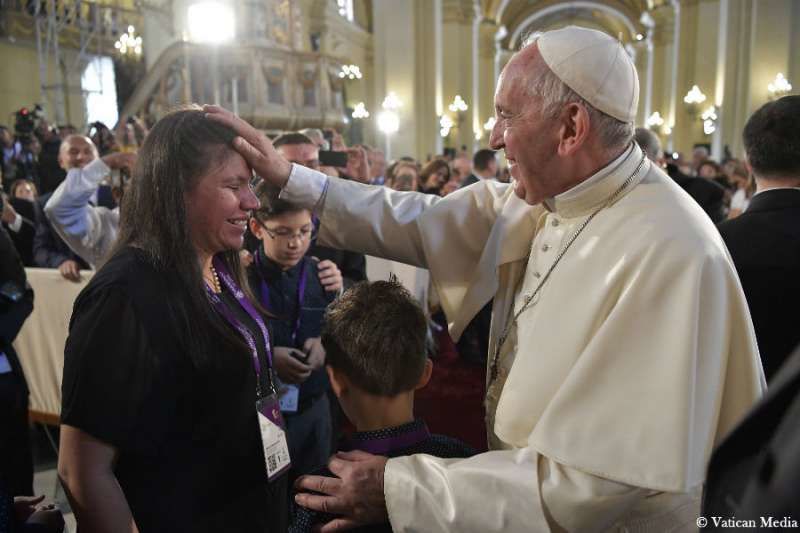On his last day in Peru, Pope Francis encouraged Catholics to imitate Jesus, who embraces the poor and suffering, and brings hope.
The Pope urged Peru’s youth to look to their grandparents and elders in order to discover “the DNA that guided their great saints,” telling them “do not lose your roots! And you, grandparents and elders, keep passing on to the new generations the traditions of your people and the wisdom that charts the path to heaven.”
“I urge all of you not to be afraid to be the saints of the 21st century,” he said, telling Peruvians that there is no better way to protect their hope “than to remain united, so that these reasons for hope may grow day by day in your hearts.”
Pope Francis offered Mass at Lima's Las Palmas Airbase on Jan. 21, his last day in Peru, bringing an end to his Jan. 15-21 tour of South America, which also included a three-day visit to Chile.
In his homily, he acknowledged the difficulties Catholics in Peru face. “Sometimes what happened to Jonah can happen to us. Our cities, with their daily situations of pain and injustice, can leave us tempted to flee, to hide, to run away,” the Pope said.
Jonah is an Old Testament prophet depicted in a scriptural book of the same name, who attempted to “flee the presence of the Lord” rather than follow a call from God.
Looking around, “Jonah, and we, have plenty of excuses to [flee],” Pope Francis said, noting that while Lima has many people who are well-off, it is also populated by the homeless: “'non-citizens,' 'the half-citizens' or 'urban remnants'” found on the streets, many of whom are children.
Faced with the desperation of people in extreme poverty, Francis said some Catholics can contract “Jonah syndrome” – which causes them to be indifferent, “deaf” and “cold of heart” to others.
Quoting his predecessor, Benedict XVI, Francis said “the true measure of humanity is essentially determined in relationship to suffering and to the sufferer.”
A society that is unable to accept the suffering of others and which is “incapable of helping to share their suffering and to bear it inwardly through ‘com-passion,’” he said, “is a cruel and inhuman society.”
The Pope noted that in the day's Gospel reading, Jesus did the opposite of Jonah: rather than fleeing, he entered a city to encounter those who were desperate and suffering, and to bring them hope.
Francis encouraged Peruvians to respond with the attitude of Jesus, who entered Galilee “to sow the seeds of a great hope.”
A seed of hope, he said, had been passed down through the apostles and the great saints of Peru, and is present now “in order to act once more as a timely antidote to the globalization of indifference.”
“In the face of [Jesus’] love, one cannot remain indifferent,” he said.
“He begins to bring to light many situations that had killed the hope of his people and to awaken a new hope,” and calls new disciples, inviting them to walk at a different pace which allows them to notice “what they had previously overlooked, and he points out new and pressing needs.”
Jesus is involved in the lives of his people and is not afraid to get others involved too, Francis said, adding that he calls us and wants to anoint us so that “we too can go out to anoint others with the oil capable of healing wounded hopes and renewing our way of seeing things.”
The Pope said Jesus also wants to awaken in Catholics a hope which “frees us from empty associations and impersonal analyses,” and encourages faith to enter “like leaven” into every aspect of our daily lives.
God will never tire of going out to meet his children, he said, asking “how will we enkindle hope if prophets are lacking? How will we face the future if unity is lacking? How will Jesus reach all those corners if daring and courageous witnesses are lacking?”
“Today the Lord calls each of you to walk with him in the city, in your city,” he said. “He invites you to become his missionary disciple, so that you can become part of that great whisper that wants to keep echoing in the different corners of our lives: Rejoice, the Lord is with you!”
After Mass, Pope Francis thanked all those who helped organize his visit, including Peruvian President Pedro Pablo Kuczynski, the country's civil authorities and the many volunteers who dedicated their time.
Francis noted that he began his trip by speaking of Peru as a land of hope, which he said comes from the country's rich biodiversity, its various cultures and traditions, and because of its youth, “who are not the future but the present of Peru.”
Interested in more? Subscribe to Angelus News to get daily articles sent to your inbox.

